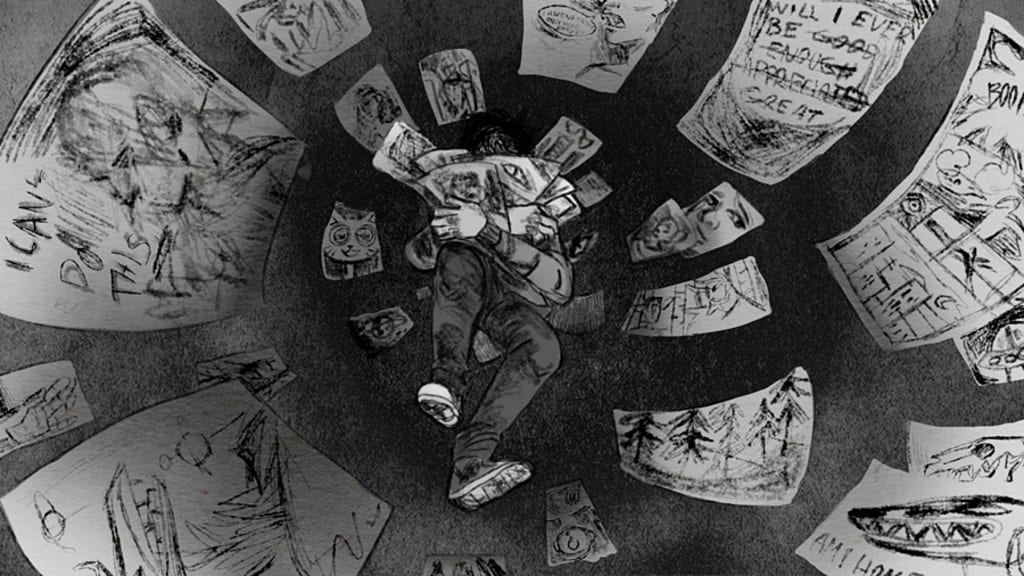THE MEDIOCRE
Given the for-the-most-part impudence and dominance, there were "trivial" pitfalls. Trivial enough to cut all those cockiness down to size.

I was every so often dogged by tests that seemed G-r-e-e-k to me. All that I could ever do was to sit still and scrutiny, bitterly gulping in the air jam-packed with failure. "This must have been the atmosphere others have breathed", I thought, which felt horrible.
Outstanding educational performance does serve as axe "exclusive" privilege to any Vietnamese student. Let alone parents' tolerance, their teachers and friends are always there to make an excuse for the exceptional's failure.
To all appearances, they loathe the elements of their all-time "golden calves". The downfall of the so-called forevermore-outstanding, thus, must have been either a wobble or overconfident move to eventually run them into such a miserable failure—whichever reason, except for proclaiming their dullness.
And the other way around with the mediocre. My very subjective perspective has it that others' counting on is pretty much a "pledge" to ease a few woeful wobbles. As a rule, the seeming hubris to hunting down perfection still acts as a precursor to academic performance, instead of due recognition.
On the other hand, the inferior's study seems somewhat miserably desperate.
Even if they ever perform phenomenally good, others would be any less sceptical, presuming it purely an accident. The truth is intermittently not what we pursue.
I later learned that such a phenomenon wasn't merely a subjective observation. It is the so-called Pygmalion effect [1] on how A's expectation towards B can impact B's performance by the "self-fulfilling prophecy".
The effect was coined after an experiment carried out at a primary California school. Accordingly, all students were placed in an IQ test, since the teachers were untold of the final results. They, after that, picked up a random group (roughly 20% the students) and assured the teachers that these "intellectuals" would sooner or later achieve high academic results and prosper more robustly than their counterparts.
After all, the two researchers, Rosenthal and Jacobson, did notice a significant IQ upsurge among those of the "rumoured" intellectual group, notably by grades 1 and 2. The figures eventually drew out a conclusion that teachers' positive attitudes acted as a precursor to students' performances (especially in their early age) [2].
Which is so mind-blown a conclusion.
Being cherished as an exceptional individual must have been sheer luck, for it's deemed pretty much inherent intangibility. Forasmuch as others have since been deprived of such a privilege.
1. Public opinion on education?
Such a universal field as education demands a careful analysis approach since views on it vary from time to time. The motto "education educates well-behaved and ethical individuals" seem incontrovertible right to elementary students only, since insights into it would, in all likelihood, stir up fierce arguments on "how well is well" and "how ethical is ethical".
Under a sociological perspective, education is what maintains societal stability and continuity. The very educational activity was pretty much a "socialization" step-up to "evolve" homo sapiens into modern humans (we did break this down in a previous article, link [3] attached below).
Insomuch as the political perspective holds that education plays the role of a reliable tool to fan out the rulers' ideologies evenly, Wherein education activities are to "civilize" and "morph" a Vietnamese of Vietnamese-oriented standards, in a socialist-oriented market economy, to demonstrate. In a like manner, any capitalist country would never set up an education system that proactively fans out communism doctrines and the other way around since they'd doom themselves with political risks and social instability.
On the other hand, an economist would take academic (in combination with other macro activities) as to catalyze the "unbridgeable opportunity gaps" between study and dropout. We all know well that those with academic knowledge can effortlessly grasp employment opportunities, earning more of a fortune than dropouts.
Data speak, not prejudice. At this rate, a society will mitigate its illiteracy and crime rate, as those committing either would gamble their "already-watered-down" lives on not going-to-school. It's not the wide-eyed presumption of "knowledge gained from schools halt the crime rate". It is instead the inherent intangibility of many other convoluted economic, political and social factors. (Find out more about the relationship between education and crime rate in [3]).
About the Creator
marie crystal
Words can be like X-rays if you use them properly -- they'll go through anything. You read and you're pierced.






Comments
There are no comments for this story
Be the first to respond and start the conversation.